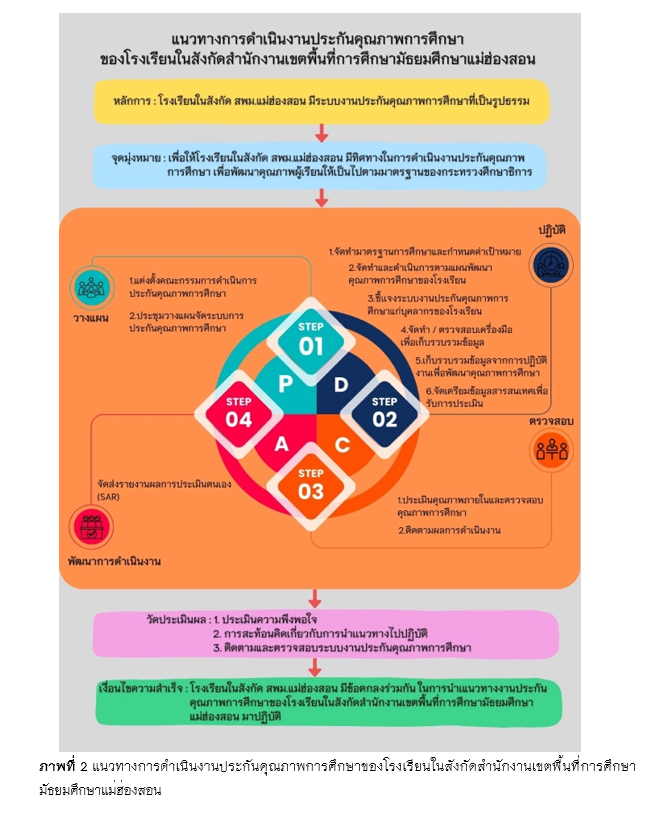แนวทางการพัฒนางานประกันคุณภาพการศึกษาของโรงเรียนในสังกัดสำนักงานเขตพื้นที่การศึกษามัธยมศึกษาแม่ฮ่องสอน
Main Article Content
บทคัดย่อ
การวิจัยครั้งนี้มีวัตถุประสงค์เพื่อ 1. ศึกษาสภาพปัจจุบันและปัญหางานประกันคุณภาพการศึกษา 2. ศึกษาการพัฒนางานประกันคุณภาพการศึกษาของโรงเรียนที่มีผลการปฏิบัติที่เป็นเลิศ (Best Practice) และ 3. เสนอแนวทางการพัฒนางานประกันคุณภาพการศึกษาของโรงเรียนในสังกัดสำนักงานเขตพื้นที่การศึกษามัธยมศึกษาแม่ฮ่องสอน ผู้ให้ข้อมูลได้แก่ 1) ผู้บริหารและครูของโรงเรียนในสังกัดสำนักงานเขตพื้นที่การศึกษามัธยมศึกษา จำนวณ 210 คน โดยใช้แบบสอบถามแบบประมาณค่า 5 ระดับ 2) ผู้บริหารหรือครูผู้รับผิดชอบงานประกันคุณภาพการศึกษาของโรงเรียนที่ได้รับรางวัลระดับชาติ โดยใช้แบบสัมภาษณ์แบบกึ่งโครงสร้างและแบบสังเกตแบบไม่มีส่วนร่วม วิเคราะห์ข้อมูลโดยใช้ค่าความถี่ ร้อยละ ค่าเฉลี่ย ส่วนเบี่ยงเบนมาตรฐาน และการวิเคราะห์เนื้อหา
ผลการวิจัยพบว่า 1. สภาพปัจจุบันของการดำเนินงานประกันคุณภาพการศึกษาของโรงเรียนในสังกัดสำนักงานเขตพื้นที่การศึกษามัธยมศึกษาแม่ฮ่องสอน โดยรวมอยู่ในระดับมาก ( = 4.50, S.D.= 0.58) เมื่อพิจารณาเป็นรายด้าน พบว่า ด้านการกำหนดมาตรฐานของสถานศึกษา มีค่าเฉลี่ยน้อยที่สุด (
= 4.05, S.D.= 0.75) ปัญหาของการดำเนินงานประกันคุณภาพการศึกษาของโรงเรียนในสังกัดสำนักงานเขตพื้นที่การศึกษามัธยมศึกษาแม่ฮ่องสอน พบว่า ด้านการจัดทำแผนพัฒนาการจัดการศึกษาของสถานศึกษา มีการกำหนดแนวทางการปฏิบัติงานของสถานศึกษาไม่ชัดเจน (f = 107) 2. การศึกษาพัฒนางานประกันคุณภาพการศึกษาของโรงเรียนที่มีผลการปฏิบัติที่เป็นเลิศ (Best Practice) ทั้ง 6 ด้าน พบว่า มีนวัตกรรมการบริหาร ดังนี้ 1) Dara Academy Team Model 2) SARAPEE Model และ 3) STAR Model ซึ่งตอบโจทย์ระบบการประกันคุณภาพการศึกษาภายในอย่างเป็นรูปธรรม 3. แนวทางการพัฒนางานประกันคุณภาพการศึกษาของโรงเรียนในสังกัดสำนักงานเขตพื้นที่การศึกษามัธยมศึกษาแม่ฮ่องสอน ประกอบด้วย 1) หลักการ 2) จุดมุ่งหมาย 3) ระบบการดำเนินงาน ซึ่งจะดำเนินงานตามวงจรคุณภาพ ได้แก่ 3.1) ขั้นวางแผน 3.2) การปฏิบัติ 3.3) การตรวจสอบ 3.4) ขั้นพัฒนาการดำเนินงาน 4) การวัดประเมินผล และ 5) เงื่อนไขความสำเร็จ
Downloads
Article Details

อนุญาตภายใต้เงื่อนไข Creative Commons Attribution-NonCommercial-NoDerivatives 4.0 International License.
เอกสารอ้างอิง
Chaengsaengthong, K., Sikkhabundit, S., & Sittisomboon, M. (2021). Management model for educational quality assurance within educational institutions Basic education level. Journal of Buddhist Social Sciences and Anthropology, 6(5), 302-317. [In Thai]
Chairot, S. (2019). Qualitative research: Approaches and techniques. Bangkok: Kasetsart University Press. [In Thai]
Educational Testing Bureau Office of the Basic Education Commission, (2018). Guidelines for developing the educational quality assurance system under the Ministerial Regulations on Education Quality Assurance B.E. 2018. Bangkok: Agricultural Cooperative Community Press of Thailand Co., Ltd. [In Thai]
Khamhuaihan, W., Toonkaew, S., & Yawirach, P. (2016). Guidelines for implementing quality assurance within educational institutions of secondary schools. Under the jurisdiction of the Secondary Educational Service Area Office Area 36. Graduate Research Journal, 7(1), 69-83. [In Thai]
Mae Hong Son Secondary Educational Service Area Office. (2022). Report on the results of the self-evaluation of the Mae Hong Son Secondary Educational Service Area Office (SAR). Mae Hong Son. [In Thai]
Office of the Basic Education Commission. (2020). Guidelines for developing a quality assurance system. Education according to the Ministry of Education Quality Assurance Regulations 2018. Bangkok: Thailand Agricultural Cooperative Community Printing Company Limited. [In Thai]
Phonwiang, S. (2021). Mechanisms for driving educational quality assurance of pilot educational institutions for the educational innovation area in Chiang Mai Province. Journal of Education Thaksin University, 21(1), 51-66. [In Thai]
Research and Learning Development. (2015). Learning towards educational quality: Meeting documents for the school quality development team in the Research and Development of Learning for Educational Quality Project. Bangkok: Institute for Research and Learning Development. [In Thai]
Secretariat of the Education Council, Ministry of Education. (2017). National Education Plan 2017-2036. (2nd ed.). Bangkok: Office of the Secretariat of the Education Council. [In Thai]
Senate Secretariat Performing duties of the Secretariat of the National Legislative Assembly. (2017). Constitution of the Kingdom of Thailand, B.E. 2017. Bangkok: Secretariat of the Senate, Performing duties of the Secretariat of the National Legislative Assembly. [In Thai]
Srisa-at, B. (2017). Preliminary research. (10th ed.). Bangkok: Suviriyasasan. [In Thai]
Sudsuk, J. (2022). Implementation of educational quality assurance. Bua Bundit Education Journal, 22(2), 49-60. [In Thai]
Suwanwattana, S. (2019). Social research: Approaches and techniques. Bangkok: Thammasat University Press. [In Thai]
Thitapan, P., & Kositphimanwet, E. (2023). Supervision and monitoring of educational quality assurance. Mahachula Khon Kaen Graduate Journal, 10(1), 46-58. [In Thai]
Worawan, M. (2020). Guidelines for developing the educational quality assurance operations of Wat Nong Khaem Secondary School. (Independent study of Master’s degree, Silpakorn University). [In Thai]


